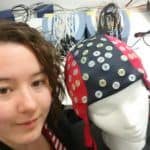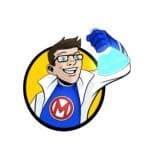-
Asked by anon-384257 on 13 Mar 2024. This question was also asked by arms1the.0
-
Martin McCoustra answered on 13 Mar 2024:
Yes… For example as a research student, I was involved in a couple of small explosions in my lab. We still don’t know why they happened. The important thing is that you assess what the risks might be in what you are doing and try to minimise the impact of those risks.
-
-
Lauren Graham answered on 13 Mar 2024:
We do use dangerous chemicals like acid for our tests. To protect ourselves my fellow scientists and I use PPE in our lab like lab coats, gloves, and safety goggles!
-
Eileen Xu answered on 13 Mar 2024:
It depends on what sort of science you do. I do most of my work on computers so the chances of something dangerous happening is really low – someone who works with chemicals though might have more dangers though!
-
Gemma Chew answered on 13 Mar 2024:
Health and safety is very important when you are a scientist. All work has to be carefully planned and any hazards have to be thought about.
I always work in a fume hood, with safety glasses, a lab coat and gloves on so I never get any chemicals on my skin or breathe any chemicals in.
I always feel safe when I am working. -
Caroline Roche answered on 13 Mar 2024:
Lots of dangerous things can happen but the likelihood of it happening will depend on your job.
I work with hazardous materials but I’m more likely to get electrocuted in the office than anything else. Alot of work goes into identifying and reducing hazards to make work safer, so the chance of anything happening should be low if you follow the guidance.
But accidents still happen, I’ve seen people get electrocuted, open the wrong valve and pump gas into a room instead of a tank, move equipment around with people in the movement area and plenty of equipment failures that you can’t prepare for.
The HSE and ONR websites provide information on some of the incidents they’ve investigated. -
Ravindu Ranaweera answered on 13 Mar 2024:
Depending on the field, yes. There are always hazards but these days health & safety is pretty rigorous. So it is safer.
-
Andrew Parrott answered on 13 Mar 2024:
There are many hazards in our lab. Some chemicals are toxic which could kill you if you accidentally ingested them. There are also very powerful lasers which could burn your skin and eyes. But as others say health and safety is very important and all work is planned so these things are thought about in advance. So, if you follow the correct procedures (e.g., always have your safety specs on) then the risk is quite low. It is probably more dangerous to drive to work than to work in the lab.
-
Mark Ridgill answered on 13 Mar 2024:
Lot’s of scientists do dangerous things but they are trained to control the risk, for instance scientists study dangerous viruses but contain them in a safe space. I’ve used dangerous chemicals but by carefully controlling the reaction conditions you can use them safely.
-
Michael Schubert answered on 14 Mar 2024:
That depends on your career! Some scientists have more exposure to danger than others. For instance, people who work in the field might be more likely to have an accident related to their environment, like a landslide or an animal bite. People who work in the labs might have to use dangerous chemicals or pathogens.
But, like many people have said, there are extremely strict health and safety protocols in all areas of science for exactly this reason. If you follow those protocols, you’re likely to protect yourself from most potential hazards.
-
Christie Waddington answered on 15 Mar 2024:
You can use dangerous chemicals and substances but there are safety protocols in place, and protective clothing (lab coat, eye protection, lab gloves for e.g.) which means you shouldn’t be in danger. Spills can happen because we’re human and can be clumsy, but there are procedures about how to properly dispose of dangerous stuff as well.
-
Katie Spencer answered on 20 Mar 2024:
I’m a conservation scientist and have spent lots of time doing fieldwork in tropical forests to collect data – there’s lots of dangers! From falling over and hurting yourself, dehydration from the walking in the heat, to being bitten by venomous snakes, and of course lots of different tropical diseases (e.g, malaria, dengue fever, parasites!). We need to do risk assessments before we go and plan for different scenarios that could happen.
-
Sharron Kenny answered on 21 Mar 2024:
can dangerous things happen ? yes… do they happen often no not at all because we have many safe things in place so that they dont and that we can all come to work safe and go home again at the end of the day
-
Hayley Pincott answered on 22 Mar 2024:
For me personally, the biggest risk would be sharps injury. When I was dealing with blood then the risk of infection with a sharps injury was higher. But working in histology means that I don’t deal with fresh tissue, it’s all fixed which means it’s been sitting in a chemical called formalin. I also handle acid, which I used to put jaws in to make them soft enough to cut up, and formalin isn’t a nice chemical as it can cause cancer. To reduce the risk of any harm I’d wear a lab coat, gloves, goggles and I’d also work on a downflow bench, this sucks all the fumes downwards so I don’t breathe them in.
Related Questions
how does your job effect your daily life ?
How long have you been a scientist for
Because you develop software for the nuclear industry if there was a nuclear bomb that was released what would happen
when did you decide what job u want to do
As time goes on it is quite obvious that computing is more advanced would that make your job as a cybersecurity person
how much do you like your job?
how did u feel when u first went into the Royal Air Force
have you crashed your plane before?
was it difficult to get into your particular area of work?
Do you think ai will take over?
Latest Questions
-
How do you make new drugs
-
how many plants do you study normally?
-
what happens when a person whos sick gets a DNA while the person is sick what do you do
-
What are polysaccharides?
-
how many nuclear explosions happen in the world
-
how does your job effect your daily life ? (2 Comments)
-
why does nuclear waste glow in the dark? (1 Comment)
-
how to you deal with problems you come across when doing your research? (2 Comments)
-
If you have been emotionally invested (focusing on anxiety if you suffer with it, dementia etc) do you find it
-
what motivates you to carry out your research? (1 Comment)
Latest Comments
-
how does your job effect your daily life ? (2 comments)
-
why does nuclear waste glow in the dark? (1 comment)
-
what motivates you to carry out your research? (1 comment)
-
how to you deal with problems you come across when doing your research? (2 comments)
-
How long have you been a scientist for (2 comments)







Comments